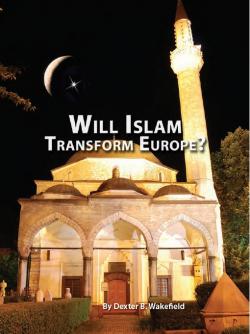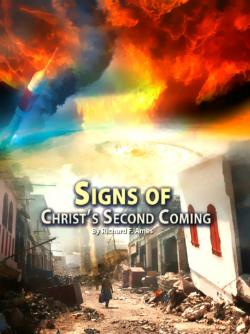Peace on Earth?
Every Christmas season, tidings of "Peace on Earth" are shared by hopeful believers. Yet the legacy of Christmas seems never to deliver on the hope. Will there ever be peace on Earth? God's Holy Days reveal the wonderful answer!
What is the Holy Day that promises true world peace? The answer might surprise you!
At the occasion of Jesus Christ's birth, a mighty angel spoke words that are among the most famous and recognizable in the Western world: "Glory to God in the highest, and on earth peace, goodwill toward men!" (Luke 2:14).
The angel's words were accompanied by a blinding light, and by the powerful, ringing voices of an angelic choir. How amazing this must have been for the shepherds to witness! So moved and frightened were they by the power of this pronouncement that the angel had to comfort them, saying, "Do not be afraid, for behold, I bring you good tidings of great joy which will be to all people. For there is born to you this day in the city of David a Savior, who is Christ the Lord" (Luke 2:10–11).
Today, most people associate the angel's announcement with the Christmas holiday. Millions use the occasion to send greeting cards with seasonal wishes of blessings and prosperity. Store placards wishing for "Peace on Earth" hang side-by-side with "50 percent off!" banners, as Christmas shopping goes into high gear. Even amid the frenzy of a consumer-driven Christmas, the hope of "Peace on Earth" taps into a deep human yearning for harmony in our world.
What Does Christmas Have To Do With It?
But how did the angel's message come to be associated with December 25? It is interesting that in the Encyclopaedia Britannica article entitled "Christmas," we read that "as late as 245 Origen repudiated the idea of keeping the birthday of Christ, 'as if he were a king Pharaoh'" (14th Edition, Vol. 5, p. 642). Even the Catholic Encyclopedia admits that "Christmas was not among the earliest festivals of the Church" ("Christmas," p. 724, Vol. III, 1908). If Christmas was "not among the earliest festivals of the Church," why are so many professing Christians keeping it?
It is common knowledge that not until the fourth century ad was December 25 officially recognized by the Roman Catholic Church as the authorized date to celebrate Christ's birth. As authors Albert and Shirley Menendez point out, the December 25 tradition came about not for biblical reasons, but because of a "political decision to counter already established and popular 'pagan' (or 'pre-Christian') festivities" (Christmas Songs Made in America, p. 3,). The "Christian\ church absorbed the Roman festival of Saturnalia and renamed it \Christmas."
What kind of festival was Saturnalia? "During Saturnalia, normal life turned upside down. Gambling was declared legal, courts were closed, and no one could be convicted of a crime. Slaves dressed in their masters' clothes and were served by their masters. A mock king was chosen to rule the festivities: He would turn up at Christmas again, centuries later, as the Lord of Misrule" (The Pageantry of Christmas, p. 10). Typical norms of decent behavior and societal restraints turned upside down? This does not sound like a peaceful way to honor the great Law-giving God; it sounds more like license to engage in misbehavior. Saturnalia—or, rather, "Christmas"—celebrated a temporary break from responsible, self-restrained conduct.
This was the nature and character of Christmas for hundreds of years. Author Stephen Nissenbaum explains that Christmas in America in the 1700s and 1800s was not about snowy "Norman Rockwell" scenes and breathtaking rides through the countryside on horse-drawn sleighs! More often than not, Christmas in early America meant "riotous disorder, racial violence, and jolly foolery… [it was a] noisy, drunken, threatening period in the eyes of the respectable" (The Battle for Christmas, p. 24). It was a true descendant of its parent, the debauched Roman festival of Saturnalia!
Christmas Crime?
In the last 150 years or so, Christmas traditions have largely been domesticated and "sanitized," losing much of their ribald past. Only traces of Christmas' rowdy roots exist, such as the yearly costume "mummers" parade televised across the United States from Philadelphia, Pennsylvania.
Yet, although millions enjoy "Christmas vacation" each year as a time to spend with family and friends, it often fails to live up to the ideals of peace and domestic tranquility that it purports to bring. For many, Christmas has a dark and even dangerous side. In their book, Unplug the Christmas Machine, authors Jo Robinson and Jean Coppock Staeheli explain that at one children's workshop, a number of youths were asked to describe significant Christmas memories. Astonishingly and tragically, six out of ten associated Christmas with unpleasant memories of parents abusing alcohol (p. 81).
Statistics actually show that certain crimes—even domestic incidents—sadly increase on this supposed day of "good cheer." Australian researchers found, in a study from 2002–06, a trend of "between one-quarter and one-third more incidents of domestic violence-related assault recorded on Christmas Day than the daily average over the period considered" ("Does crime increase over Christmas and New Year?," New South Wales Bureau of Crime Statistics and Research). The same study revealed that non-domestic violence-related assault showed a spike in the week before Christmas. The report explains that this was "probably due to the large number of social activities and increased alcohol consumption around this time." Even instances of "malicious damage to property" go up in the days just before Christmas (ibid.). Thankfully, not everyone has such negative experiences. But the question remains—why does Christmas fail to deliver on its supposed promise?
Scripture describes God as the "God of peace" (Romans 16:20; Philippians 4:9; 1 Thessalonians 5:23; Hebrews 13:20). Jesus Christ promised to give "peace" in the midst of the world's dangers and frights. He told His disciples, "Peace I leave with you, My peace I give to you; not as the world gives do I give to you. Let not your heart be troubled, neither let it be afraid" (John 14:27). Even if we are buffeted by problems and trials, God wants us to have the deep inner peace that comes from the indwelling of His Holy Spirit, facilitating profound obedience to Him (Acts 5:32). He wants us to have peace that "surpasses all understanding" (Philippians 4:7).
Not only does God want Christians to experience inner peace, He wants peace to spread to all mankind! How will that happen? Christmas does not have the answer. Yet, "God is not the author of confusion but of peace, as in all the churches of the saints" (1 Corinthians 14:33). So, where can we look to find God's actual plan for peace? We can find it in God's word—in particular, in His revelation of His annual Holy Days, which picture His plan of salvation for all humanity!
What Would Jesus Keep?
What were the festivals Jesus and His disciples kept? Should we be following their example? Should you be keeping the festivals of the Bible today? What might these Holy Days teach us about the overall plan of God for man? And what do they tell us about the coming reign of Christ—about peace on earth and goodwill toward men?
Most professing Christians today have been taught that they do not need to keep the Holy Days that Jesus and the Apostles kept. Maybe you have been taught that these days are "Jewish" or that they have been "done away." But what does your Bible really say? True followers of Jesus Christ are to "follow in His steps" (1 Peter 2:21) and "walk just as He walked" (1 John 2:6). To do that, we need to discover how He lived, and which Holy Days He kept when He walked the earth.
Scripture clearly shows that Jesus kept the seventh-day Sabbath as a way of life (Luke 4:16). From His youth, He observed the seven annual Holy Days, including the Passover and the Days of Unleavened Bread (Luke 2:40–43). Later we read that, during His ministry, Christ went up to Jerusalem to keep the Feast of Tabernacles (John 7:2, 10).
So, are the Holy Days just a historical curiosity—an obscure and no-longer-relevant detail about Jesus' life? No! In fact, the Holy Days depict the full panorama of God's plan of salvation for humanity! For a complete explanation, please request our free booklet The Holy Days: God's Master Plan. Observing the Holy Days is not only part of doing what Jesus did; it allows us to understand what He taught, and why!
The annual cycle of God's biblical Holy Days begins with Passover, which comes in the first month of God's sacred calendar, corresponding to March or April on the Roman calendar (Exodus 12:2). Passover is an annual reminder of Christ's sacrifice to pay for our sins. First-century Christians kept the Passover by a solemn observance (1 Corinthians 11:23–26), as do true Christians to this day.
During the seven Days of Unleavened Bread, also in the spring, Christians remove physical leaven and leavening agents from their homes, conveying the lesson of putting sin out of their lives. Paul taught this fundamental truth in 1 Corinthians 5:7–8. The first and last days are "high days," kept by the cessation from work and by worshiping with God's people.
Next comes the Day of Pentecost, which the disciples were observing when God poured out His Holy Spirit on the Church (Acts 2:1–4). This day is also called the Feast of Harvest or Firstfruits. It represents the small harvest of those whom God is calling out of the world now (1 Corinthians 1:26–28). Most professing Christians do not realize that God is only working with a small group of firstfruits today (Revelation 14:1–5), preparing them for a special purpose in the future—to reign under Christ in His Kingdom on earth (Luke 19:17, 19). On each Pentecost, true Christians abstain from customary work, and congregate together for worship.
The Feast of Trumpets is the next Holy Day in the annual calendar, coming at the start of the seventh month of God's year (September or October on the Roman calendar). This Holy Day represents an event yet in the future—Jesus Christ's triumphant return to earth! The day is associated with the "blowing of trumpets" or a ram's horn—an ancient instrument for calling men to arms—to symbolize that Christ will return during a time of widespread violence and war. The trumpets are a warning to prepare for the calamity ahead (Matthew 24:13). God's Church is to be a "watchman" (Ezekiel 33:7), "blowing the trumpet" to warn the world—including the modern descendants of ancient Israel—of God's impending judgment. This Holy Day is also a day of rest from work, and of gathering for worship (Leviticus 23:24–25).
Coming just ten days later, the Day of Atonement is a solemn observance that represents the binding of Satan the Devil for a thousand years (Revelation 20:1–2). In addition to coming together for worship, God's people fast on this day (Leviticus 23:27).
The Feast of Tabernacles: True Festival of Peace!
The next Holy Day, the Feast of Tabernacles, comes five days after the Day of Atonement (Leviticus 23:33–35). When the children of Israel sojourned in the wilderness, God dwelt with them in a "tabernacle"—a portable or temporary dwelling place. The Feast of Tabernacles pictures the soon-coming Millennium of Jesus Christ's rule on planet Earth, when physical human beings will for a thousand years live under the benevolent and just reign of the Kingdom of God. Unlike the past 6,000 years of mankind's mis-rule, this will be a time when wrongs will be righted and the oppressed will be oppressed no more!
Notice some of the prophecies concerning the millennial time that the Feast of Tabernacles symbolizes: "Now it shall come to pass in the latter days that the mountain of the Lord's house shall be established on the top of the mountains" (Isaiah 2:2). That is a reference to Jesus Christ setting up a kingdom that will be superior to every other kingdom that has ever been on earth (Daniel 2:44). What will be the result of the righteous reign of this King of kings? "He shall judge between the nations, and rebuke many people; they shall beat their swords into plowshares, and their spears into pruning hooks; nation shall not lift up sword against nation, neither shall they learn war anymore" (Isaiah 2:4).
Jesus Christ will govern from Jerusalem. He will correct and re-train those who have learned to settle differences with the knife, gun or spear. He will teach them a new and different way. War will be a thing of the past. "Peace on Earth" will no longer be an empty slogan—it will really occur! The Feast of Tabernacles pictures it!
Jesus Christ's government will care for those who are oppressed and suffering: "But with righteousness He shall judge the poor, and decide with equity for the meek of the earth… They shall not hurt nor destroy in all My holy mountain, for the earth shall be full of the knowledge of the Lord as the waters cover the sea" (Isaiah 11:4, 9). Resurrected Christians from our present age, the "firstfruits," will rule under Jesus Christ, administering His government (Jude 14–15; 1 Corinthians 6:2). These glorified firstfruits will govern cities (Luke 19:17, 19) on the earth for a thousand years (Revelation 5:10; 20:4–6). They will have a part in teaching this new way of peace. As Isaiah foretells: "And though the Lord gives you the bread of adversity and the water of affliction, yet your teachers will not be moved into a corner anymore, but your eyes shall see your teachers. Your ears shall hear a word behind you, saying, 'This is the way, walk in it,' whenever you turn to the right hand or whenever you turn to the left" (Isaiah 30:20–21).
When you really understand it, the Feast of Tabernacles is an eye-opening look into the glorious future of humanity! It promises a time of relief from the pain and suffering of this age. It shows that hatred, violence, and war will come to an end. Jesus Christ will personally stamp it out when He comes to rule!
Instead of the "Lord of Misrule" associated with the deceptive traditions of Christmas, Jesus Christ will rule as the "Prince of Peace!" We read, "For unto us a Child is born, unto us a Son is given; and the government will be upon His shoulder. And His name will be called Wonderful, Counselor, Mighty God, Everlasting Father, Prince of Peace" (Isaiah 9:6). God speed that day!
God Will "Tabernacle" With Mankind
During the ancient Israelites' sojourn in the wilderness, the Tabernacle reminded them that God was dwelling with them. It also pointed toward the Messiah who would come to the earth to live and die for all humanity. But, there was more! It also looked forward symbolically to Christ's second coming! When Jesus Christ returns, He will "tabernacle"—live—among mankind, reigning as King of kings (Revelation 17:14). Is the promise of Christ's second coming real to you? Is it a reality you are excited about and anticipating (Luke 21:28)? Do you want to be one of those whom Christ will use to teach the world a better way? If so, keep the Feast—it will help you picture, understand and prepare!
Jesus and His disciples never observed Christmas. But they did observe the Feast of Tabernacles. Bible prophecy says nothing about the whole world keeping Christmas. But it does give us a promise that, in the Kingdom of God, all nations will keep the Feast of Tabernacles together. "And it shall come to pass that everyone who is left of all the nations which came against Jerusalem shall go up from year to year to worship the King, the Lord of hosts, and to keep the Feast of Tabernacles" (Zechariah 14:16).
"Peace on earth, goodwill toward men" is not a fantasy or abstract idea. It is a reality that will come, as surely as Jesus Christ will return. God's Church keeps the Feast of Tabernacles each year, gaining a small foretaste of that soon-coming time when the whole world will experience the peace that "surpasses all understanding" (Philippians 4:7). Will you keep the Feast?






